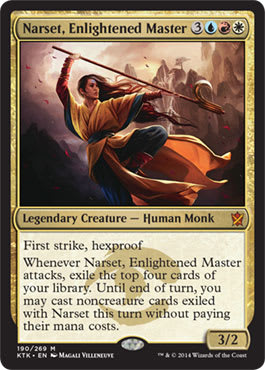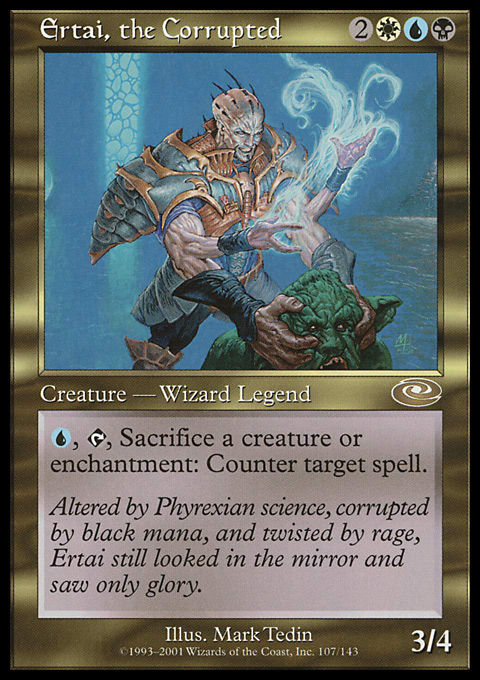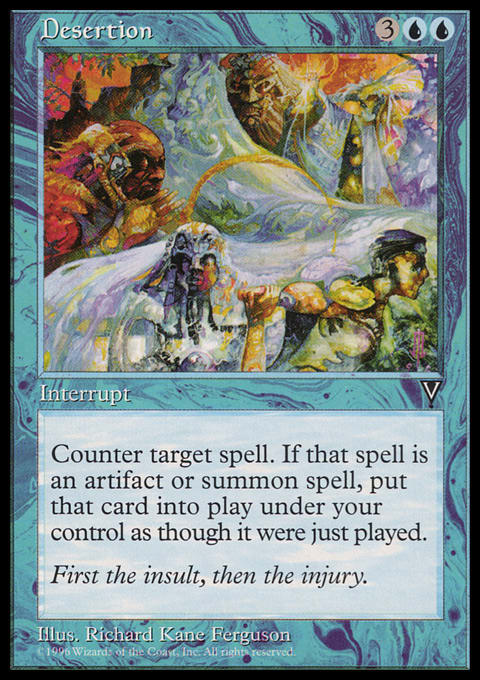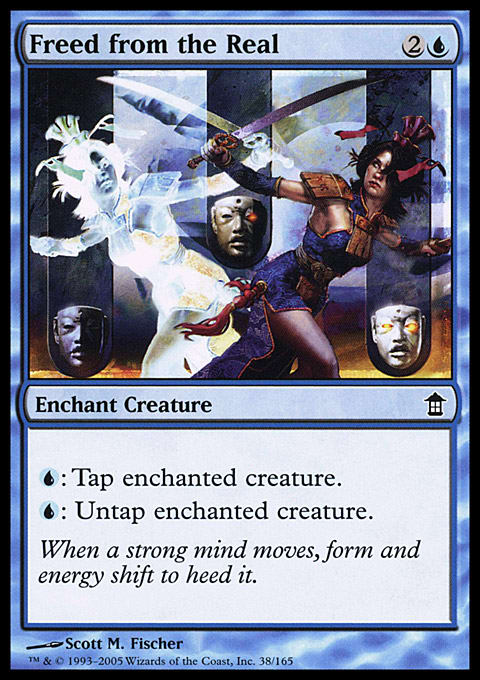I have written about and mentioned The Rafiq Problem so often in this series and in my other writings that it’s caught on quite a bit. People understand what it’s like to sit down and see a scary commander on someone’s mat and understand that the person must be murdered at all costs before the person does something degenerate. You can build a 75% Narset, Enlightened Master pillow-fort deck if you want, but expect to be murdered as if you were playing a hardcore, extra-turns Narset deck, so maybe don’t bother. It can be a bit of a bummer not to be able to build certain decks certain ways because of harsh realities and the inherent mistrust in playing with new playgroups, but it’s called harsh reality for a reason.
Rafiq can’t really do anything for your opponents, apart from “not attack and murder them directly,” and that’s an important thing to remember. Some commanders are inherently threatening, and some are inherently fluffy-looking. Is there a way we can present a threatening commander in a way that makes it look less threatening? Can we play the deck a certain way to get people to see that we are going to have a shot at winning but that it won’t be necessary to completely dogpile us? In other words, what is a way to make a table of people not known to us stomach a scary-looking commander without relying on them to all have even scarier-looking commanders? Also, if they all have scary-looking commanders, put away your 75% deck, dummy. Or don’t—I’m not the police. Just sayin’.
What’s a commander that seems it could be super-annoying but that can actually demonstrate a little bit of value to the other people at the table and therefore make you seem more useful than threatening? I spend time thinking about alternatives to some “Rafiq Problem” commanders, but I haven’t really given them their own articles—yet. Is that something you want to read about, or would I just be remaking the case for the Rafiq Problem being a real thing and not adding anything of value? Let me know what you think, and we can revisit the topic in future weeks. It’s not as though we have any Commander (2016 Edition) previews to look at, after all.
So what inspired this particular idea? Well, since I am a glutton for punishment, I was scrolling through the EDH subreddit and came across a post titled, “Looking for an Esper control commander that isn’t Oloro,” and I thought to myself, “You had me at ‘isn’t Oloro,’” so I clicked on it. In the discussion, /u/willblaze had the top comment with his suggestion of Ertai, the Corrupted. Nothing says “Esper control” quite like a Counterspell on a stick. Ironically, if you stack Ertai up next to Talrand, Sky Summoner and ask people to guess which deck is going to counter more of their spells, they’d probably say Ertai and probably be wrong. Ertai looks annoying. Sure, there is a pretty high cost to being able to counter spells, but a Counterspell on a stick looks pretty intimidating. So why would we want to pursue a deck like this? Wouldn’t everyone decide they don’t want all of their spells countered and grind you into a fine powder before you even get out of the gate? Or is there something you can offer them?
I want to make the case that a commander like Ertai has something very important to offer, and that is his ability to keep the game interesting. Tooth and Nail for an infinite combo? I think not; let’s keep the game going a bit longer. Armageddon everyone out of the game? Not on Ertai’s watch! Insurrection? Not today, sucker! Fourth example? Ertai says no to that, too. Comedy doesn’t have many rules, but the rule of three is one of them. The fact that you can keep the game interesting by representing a counter to a lot of the spells that can put one person way in the lead means you can be valuable to everyone. Sure, you may impede them from pulling way ahead, but since you will do the same to everyone, it’s fair, and they’ll want to keep you around. Since there is a cost to his ability—both tapping him and thereby exhausting his usefulness for the remainder of the turn cycle and also the fact that you’re forced to consume resources in the form of creatures and enchantments—means his power level is attenuated. You have to choose what to counter carefully, and that means you won’t be frivolous with his ability. All of these factors are the perfect recipe for responsible use. If your opponents can be convinced you’re going to wield your power responsibly, they’ll be less likely to try to topple you like a despot/statue of a despot.
I didn’t know where to start, but /u/jeffseadot provided us with a starting point, and it’s actually pretty good as is. If anything, I’ll be taking stuff out just to add stuff I like rather than because it violates a 75% principle.
Ertai, the Corrupted ? Commander | /u/Jeffseadot
- Commander (0)
- Creatures (23)
- 1 Angel of Despair
- 1 Auramancer
- 1 Azorius Guildmage
- 1 Gravedigger
- 1 Hypnotic Siren
- 1 Monk Idealist
- 1 Mulldrifter
- 1 New Prahv Guildmage
- 1 Ogre Slumlord
- 1 Rune-Scarred Demon
- 1 Shadowmage Infiltrator
- 1 Soul of Innistrad
- 1 Typhoid Rats
- 1 Wall of Frost
- 1 Weathered Wayfarer
- 1 Gold Myr
- 1 Leaden Myr
- 1 Palladium Myr
- 1 Silver Myr
- 1 Arcanis the Omnipotent
- 1 Kira, Great Glass-Spinner
- 1 Merieke Ri Berit
- 1 Reya Dawnbringer
- Spells (39)
- 1 Absorb
- 1 Counterspell
- 1 Dismantling Blow
- 1 Dismiss
- 1 Fact or Fiction
- 1 Impulse
- 1 Jace's Ingenuity
- 1 Mortify
- 1 Swords to Plowshares
- 1 Undermine
- 1 Crux of Fate
- 1 Diabolic Revelation
- 1 Diabolic Tutor
- 1 In Garruk's Wake
- 1 Wrath of God
- 1 Control Magic
- 1 Debtors' Knell
- 1 Demonic Pact
- 1 Grave Pact
- 1 Island Sanctuary
- 1 Mind Control
- 1 Mobilization
- 1 Mystic Remora
- 1 Reality Acid
- 1 Rhystic Study
- 1 Seal of Doom
- 1 Steal Artifact
- 1 Volition Reins
- 1 Azorius Keyrune
- 1 Chronatog Totem
- 1 Darksteel Ingot
- 1 Lightning Greaves
- 1 Obelisk of Esper
- 1 Orzhov Keyrune
- 1 Skull of Orm
- 1 Skullclamp
- 1 Staff of Domination
- 1 Thran Dynamo
- 1 Wayfarer's Bauble
- Lands (37)
- 4 Plains
- 7 Swamp
- 9 Island
- 1 Adarkar Wastes
- 1 Azorius Chancery
- 1 Caves of Koilos
- 1 Dimir Aqueduct
- 1 Dismal Backwater
- 1 Evolving Wilds
- 1 Flooded Strand
- 1 Godless Shrine
- 1 Reliquary Tower
- 1 Scoured Barrens
- 1 Tainted Isle
- 1 Tranquil Cove
- 1 Tundra
- 1 Vivid Creek
- 1 Vivid Marsh
- 1 Watery Grave
- 1 Frost Marsh
This seems pretty budgety, but effective. If we want to build 75%, I think we can improve on a few creatures like Gravedigger and Typhoid Rats, but we don’t have to. This deck’s strength is that you can deter big spells or make players work together to get things to resolve.
Before I go into how I would build a little differently, how does this jive with our rule governing the fact that it’s better to punish our opponents for doing things than it is to prevent them from doing them? Isn’t using Ertai inherently going to prevent our opponents from doing things? I don’t see an inconsistency here as much as a good opportunity for clarification. I don’t see having Ertai be your commander as any more likely to prevent our opponents from doing their things than running Desertion in your deck and using it to counter a Tunnel Vision or Craterhoof Behemoth. Preventing our opponent from doing anything with a bought-back Forbid in a French matchup is oppressive. Packing a Hindering Light in a Bruna, Light of Alabaster deck isn’t. As with anything, our intentions matter, and in this case, having a cost associated with Ertai and only being able to use him once per turn cycle (until you go ham with an Umbral Mantle, I guess) means you can’t really use this countermagic to oppress people. At what point does being able to stop one opponent from being able to do that player’s thing become less about oppressing that one person and more about preserving the game state? That’s what you offer the table with Ertai: the promise that you can be the last line of defense between whoever is farthest ahead and a swift conclusion of the game. If everyone knows about Ertai on the table, they can absolutely play around his ability. Does Ertai prevent our opponents from doing things? Sometimes. But this is an example that shows some of the nuance to that guideline and shows how we can build a commander with built-in countermagic that can be a political tool rather than an oppression mechanism.
Would I make any changes to /u/Jeffseadot’s list to make it a little more competitive, a little less budget, and totally 75%? I think so. There are a few cards I would run that he isn’t because that’s the kind of person I am and there are a few (very few) cards he runs that I wouldn’t—Diabolic Tutor, basically. Who needs it?
Ertai the Useful ? Commander | Jason Alt
- Commander (0)
- Creatures (23)
- 1 Angel of Despair
- 1 Aura Thief
- 1 Azorius Guildmage
- 1 Guile
- 1 Hypnotic Siren
- 1 Karmic Guide
- 1 Lullmage Mentor
- 1 Mulldrifter
- 1 New Prahv Guildmage
- 1 Ogre Slumlord
- 1 Reef Worm
- 1 Soul of Innistrad
- 1 Weathered Wayfarer
- 1 Gold Myr
- 1 Leaden Myr
- 1 Palladium Myr
- 1 Silver Myr
- 1 Solemn Simulacrum
- 1 Arcanis the Omnipotent
- 1 Daxos the Returned
- 1 Kira, Great Glass-Spinner
- 1 Merieke Ri Berit
- 1 Reya Dawnbringer
- Spells (39)
- 1 Dismantling Blow
- 1 Fact or Fiction
- 1 Impulse
- 1 Jace's Ingenuity
- 1 Mortify
- 1 Swords to Plowshares
- 1 Crux of Fate
- 1 Diabolic Revelation
- 1 Diabolic Tutor
- 1 In Garruk's Wake
- 1 Wrath of God
- 1 Chamber of Manipulation
- 1 Control Magic
- 1 Debtors' Knell
- 1 Demonic Pact
- 1 Dictate of Erebos
- 1 Grave Pact
- 1 Hatching Plans
- 1 Island Sanctuary
- 1 Mind Control
- 1 Mobilization
- 1 Mystic Remora
- 1 Pemmin's Aura
- 1 Reality Acid
- 1 Rhystic Study
- 1 Steal Artifact
- 1 Volition Reins
- 1 Azorius Keyrune
- 1 Chronatog Totem
- 1 Darksteel Ingot
- 1 Lightning Greaves
- 1 Obelisk of Esper
- 1 Orzhov Keyrune
- 1 Skull of Orm
- 1 Skullclamp
- 1 Staff of Domination
- 1 Thousand-Year Elixir
- 1 Thran Dynamo
- 1 Trading Post
- Lands (37)
- 4 Plains
- 7 Swamp
- 9 Island
- 1 Adarkar Wastes
- 1 Azorius Chancery
- 1 Caves of Koilos
- 1 Dimir Aqueduct
- 1 Dismal Backwater
- 1 Evolving Wilds
- 1 Flooded Strand
- 1 Godless Shrine
- 1 Reliquary Tower
- 1 Riptide Laboratory
- 1 Tainted Isle
- 1 Tranquil Cove
- 1 Vivid Creek
- 1 Vivid Marsh
- 1 Watery Grave
- 1 Frost Marsh
- 1 Minamo, School at Water's Edge
I tried to preserve the way the deck played while optimizing a few of the card choices. I added stuff I wanted to play, like Aura Thief and Hatching Plans, and I doubled up on a few of the Grave Pact effects while cutting some countermagic. I could have cut a lot deeper, too, but I didn’t want to totally change the deck (or even 75% change it—sorry, had to), but rather, put my own spin on it.
I added a few cards to make Ertai slightly more effective, like Thousand-Year Elixir and Minamo, School at Water's Edge. If I wanted to go even deeper, I’d add stuff like Freed from the Real and Umbral Mantle. Erati isn’t expected to stick around that long if you can’t protect him, so Swiftfoot Boots and Lightning Greaves are always nice. A few more Auras to try to keep Ertai safe may be necessary in practice, but it’s hard to tell that now.
All in all, we have a pretty decent deck here that isn’t going to oppress anyone but that should still be capable of exerting control over the game. You’re going to want everyone to know that keeping you alive means you can be the one to stave off an opponent playing that oops-I-win card, and that may be enough to give you time to set up. You’re going to benefit from sacrificing permanents with both of these builds, and you’re going to counter key spells to keep someone from surging ahead or winning, but you’re not going to counter everything and anything and make people miserable. That compromise is one everyone can live with, especially you. Isn’t compromise what it’s all about?
That does it for me this week. Join me next week, when I’ll talk about . . . something else, clearly—I am just not sure what yet. In the meantime, what do we think? Does this in your mind violate our tenet about preferring punishment to prevention? Is Ertai too likely to suffer from the Rafiq Problem? Want me to talk about a deck of yours? Leave it in the comments. Until next time!



























